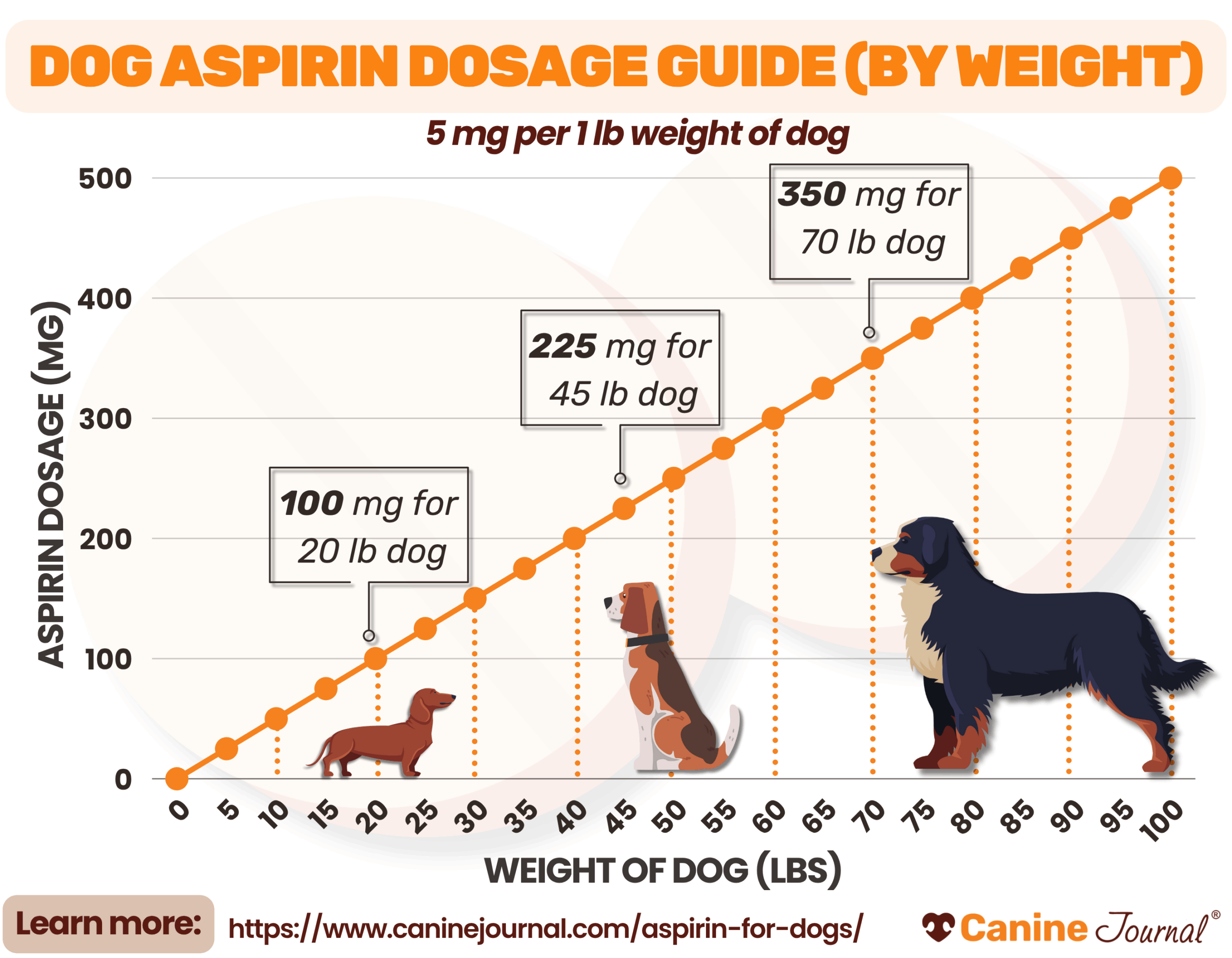Aspirin & Your Dog: The Ultimate Safety Guide
When you purchase through links on our site, we may earn a commission. Here’s how it works.
Thinking about giving your dog aspirin for pain relief? You’re not alone. It’s a common question, especially when your pup seems stiff, sore, or uncomfortable.
Table of Contents
While aspirin is sometimes used under veterinary guidance, it’s not always safe. Some dogs can have serious side effects, even from a small dose.
Is Aspirin Safe for Dogs Or A Disaster Waiting To Happen?
Aspirin can be safe for dogs, but only in specific cases and only under veterinary supervision. It is not a medication you should give without guidance, even if your dog is limping or seems uncomfortable.

Dogs process medications differently than humans. The wrong dose or giving it too frequently can lead to side effects like vomiting, stomach ulcers, or internal bleeding.
Some dogs should never take aspirin at all, especially those with kidney disease, bleeding disorders, or who are already on other medications.
Quick Takeaway: Aspirin may help alleviate short-term pain, but it is not a long-term solution. Always consult your veterinarian before administering it. There are safer options available.
Is Baby Aspirin Safer For Dogs Than Regular Aspirin?
Not necessarily. Baby aspirin has a lower dosage per tablet, which makes it easier to control how much you’re giving. But that doesn’t mean it’s automatically safer.
The real issue is that any kind of aspirin, including baby aspirin, can still cause serious side effects in dogs. Smaller tablets may reduce the risk of overdose, but they can still lead to stomach irritation, ulcers, or internal bleeding if used incorrectly or given too often.
If your vet does recommend aspirin, they’ll usually suggest a very specific dose based on your dog’s weight and health history. Never try to guess the right amount, even if the label says “low dose.”
Quick Tip: If your vet gives the green light, using baby aspirin may make it easier to follow the exact dose. But it is not a substitute for professional guidance.
Baby Aspirin vs Regular Aspirin: What’s The Difference?
| Type | Typical Dosage (Per Tablet) | Easier to Dose for Small Dogs? | Vet Recommended? |
|---|---|---|---|
| Baby Aspirin | 81 mg | Yes | Sometimes |
| Regular Aspirin | 325 mg | No | Rarely |
Note: Even low-dose (baby) aspirin can be dangerous without your vet’s guidance. Always confirm dosing and frequency before giving any aspirin to your dog.
What Happens If You Give Too Much?
Aspirin is especially risky for dogs with certain health conditions. You should never give aspirin if your dog has:
- An aspirin allergy
- A bleeding disorder
- Stomach ulcers
- Asthma
- Kidney or liver disease
- Cancer
- Low blood protein
Even healthy dogs can have serious side effects, especially with repeated use. Some symptoms appear right away, while others build up over time.
Warning Signs Of Aspirin Toxicity
- Vomiting (with or without blood)
- Diarrhea or upset stomach
- Black, tarry stool
- Loss of appetite
- Lethargy or weakness
- Pale gums
- Fever
- Rapid breathing
Signs Of Severe Poisoning
- Disorientation or wobbliness
- Tremors or seizures
- Hemorrhaging or visible ulcers
- Collapse or coma
If your dog shows any of these signs, contact your vet or the Pet Poison Helpline at 1-855-764-7661 immediately. The faster you act, the better the outcome.
Quick Takeaway: Aspirin can be dangerous even in small amounts. Know the risks, watch for symptoms, and always err on the side of caution.
How Is Aspirin Poisoning Treated in Dogs?
If you suspect your dog has had too much aspirin, immediate action is crucial. Call your vet or an emergency animal hospital right away. Do not wait for symptoms to get worse.

What Vets Typically Do
- Induce vomiting: If the aspirin was ingested recently, your vet may try to flush it from your dog’s system by inducing vomiting.
- Administer activated charcoal: This can help absorb any remaining aspirin in the stomach and reduce further absorption into the bloodstream.
- Provide IV fluids and supportive care: Hospitalization may be needed. Fluids support kidney function, maintain hydration, and help stabilize your dog.
- Monitor for organ damage: Bloodwork will help assess liver and kidney function. In severe cases, medication may be needed to treat ulcers, seizures, or bleeding disorders.
Recovery depends on how quickly treatment begins and how much aspirin your dog consumed. The prognosis is often good if caught early, but delays can lead to permanent damage or death.
Quick Tip: If your vet isn’t available, call the ASPCA Animal Poison Control Center (888-426-4435) or Pet Poison Helpline (855-764-7661) for immediate guidance.
How Much Aspirin Can I Give My Dog?
The standard dosage veterinarians may recommend is 5 mg per pound of body weight, given once or twice daily. But this is not one-size-fits-all. Your dog’s age, breed, health conditions, and other medications can all affect what’s safe.

Even if your dog has taken aspirin before, never give a dose without checking with your vet first.
Aspirin Dosage For Dogs
| Dog’s Weight | Typical Dose (5 mg/lb) | Baby Aspirin (81 mg) | Regular Aspirin (325 mg) |
|---|---|---|---|
| 10 lb | 50 mg | ~⅔ tablet | Too strong |
| 20 lb | 100 mg | ~1¼ tablets | Too strong |
| 40 lb | 200 mg | ~2½ tablets | ~⅔ tablet |
| 60 lb | 300 mg | ~3¾ tablets | ~1 tablet |
| 80 lb | 400 mg | ~5 tablets | ~1¼ tablets |
Important Notes:
- These are general guidelines, not vet-approved prescriptions
- Dosing is hard to get exactly right with human tablets
- Too much can lead to ulcers, kidney damage, or worse
Quick Tip: Ask your vet if a dog-specific pain reliever is safer. Many vets prefer prescribing medications designed for dogs because they are easier to dose and cause fewer side effects.
Safer Alternatives To Aspirin For Dogs
Many veterinarians avoid recommending aspirin altogether, especially for long-term use. There are safer, more targeted pain relief options available, including both prescription medications and natural remedies.
Prescription Options (Vet-Approved)
These non-steroidal anti-inflammatory drugs (NSAIDs) are designed specifically for dogs. Your vet may recommend one of the following based on your dog’s condition:
- Carprofen (brand name Rimadyl or Novox)
- Deracoxib (Deramaxx)
- Firocoxib (Previcox)
- Meloxicam (Metacam)
These medications help reduce inflammation, joint pain, and post-surgical discomfort. While generally safer than aspirin, they can still cause side effects in some dogs. Always follow your vet’s dosing instructions and monitor for any changes in behavior or appetite.
Natural & Alternative Remedies
If you’re looking for options beyond pharmaceuticals, some natural approaches may offer relief—especially for dogs with arthritis or chronic joint pain.

- Omega-3 fatty acid supplements: May help reduce inflammation and support joint health over time.
- Dog-specific joint supplements: Often include glucosamine, chondroitin, or MSM for mobility support.
- CBD oil or treats: Some pet owners and holistic vets report reduced pain and anxiety with CBD. Only use products formulated for pets, and confirm safety with your vet.
- Light therapy: Also known as low-level laser therapy, this treatment uses specific light wavelengths to promote circulation, reduce inflammation, and support healing.
- Canine physical therapy: Physical rehab programs can improve strength, flexibility, and range of motion. Therapies may include underwater treadmills, guided exercises, and stretching techniques.
- Acupuncture or canine massage: These therapies can improve circulation, reduce stiffness, and support recovery when done by trained professionals.
Quick Tip: Always check with your vet before trying any new supplement or therapy. Even natural products can interact with other medications or be unsafe for certain conditions.
A Real-Life Example: When Aspirin Helped
A few years ago, my dog Daisy slipped while playing fetch and came up limping. She’s a big girl, about 85 pounds, and while nothing was broken, she’d strained the muscles in her back leg pretty badly. She wouldn’t put any weight on it and was in a good amount of pain.
The vet recommended giving her some pet aspirin to help manage the discomfort, and honestly, it worked wonders. Before long, Daisy was ready to charge back outside, ball in mouth, tail wagging like nothing had happened. The main challenge was keeping her from overdoing it too soon since the medication helped her feel so much better.
This experience reminded me how powerful even over-the-counter treatments can be—when used the right way and under veterinary care.
– Danielle DeGroot, Pet Parent & Canine Journal Writer
Frequently Asked Questions
Still unsure about giving aspirin to your pup? These are some of the most common questions dog owners ask when considering pain relief options.
Don’t see yours? Ask us in the comments!
Can I Give My Dog Aspirin Without Talking to My Vet?
No, you should always consult your vet first. Even if your dog has taken aspirin before, health conditions or weight changes could affect how safe it is now. Your vet may recommend a different medication entirely or adjust the dose based on your dog’s needs.
Self-dosing without guidance is one of the most common causes of aspirin toxicity in dogs.
Can Dogs Have Aspirin Every Day?
Aspirin is not meant for long-term use in dogs. It may be used for short-term pain under close veterinary supervision, but repeated dosing can damage the stomach lining and affect kidney function.
For ongoing pain or arthritis, your vet will likely suggest a safer daily option specifically formulated for dogs.
Can I Use Coated Or Buffered Aspirin?
Buffered or enteric-coated aspirin may be slightly easier on the stomach in humans, but dogs don’t process these forms the same way. Coated tablets can actually delay absorption, which may make dosing less predictable.
Your vet will tell you whether any specific type is appropriate. Never assume a human formulation is safer just because it’s labeled as “gentle.”
What Should I Do If I Accidentally Gave My Dog Too Much?
Call your vet immediately. If your regular vet is closed, contact an emergency clinic or pet poison hotline. The sooner treatment begins, the better your dog’s chances for recovery.
Do not try to treat aspirin poisoning at home. Home remedies or waiting it out could cost your dog valuable time.
Is Aspirin For Dogs Ever The Best Option?
In some cases, yes, but only when prescribed by a veterinarian for a specific short-term condition. Aspirin is not a go-to choice for most vets because safer, more effective dog-specific medications are available.
If your vet does recommend aspirin, they’ll give you an exact dosage and timeline based on your dog’s weight and health status.
What Other OTC Meds Are Safe For Dogs?
You may be wondering if any human medications are safe to give your pup. Yes, some are generally considered safe with your vet’s green light. But see our guide to which OTC medications are safe (and aren’t) for dogs. We include some common brands and dosing guidelines to help with allergies, an upset stomach, minor skin wounds, and more.



